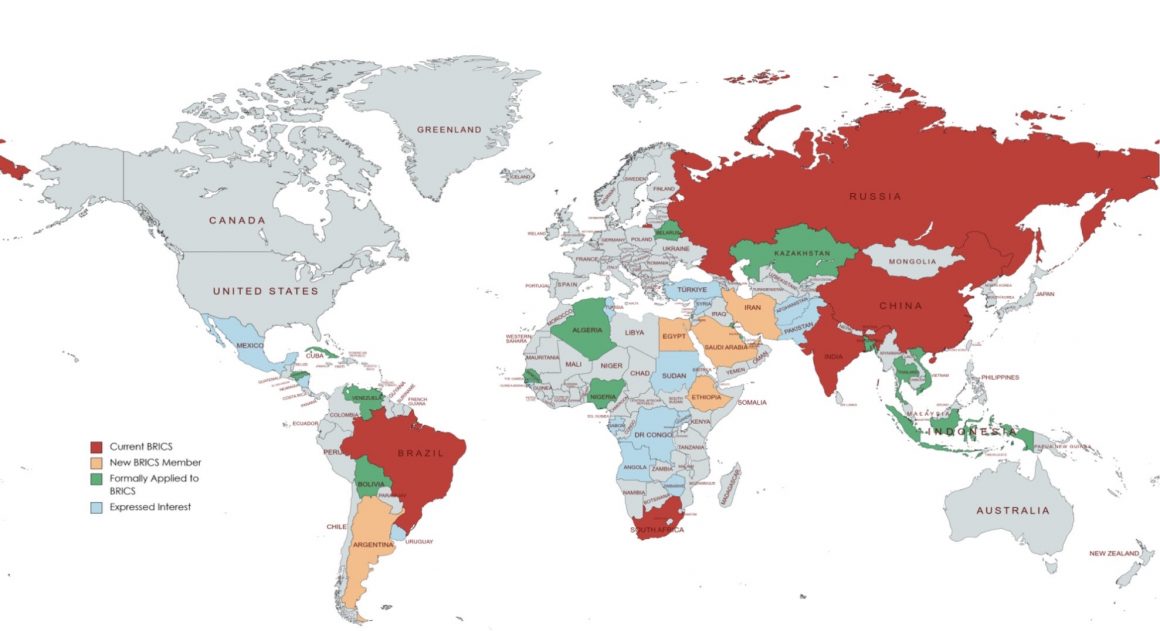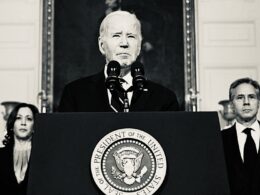Imperialism’s narrative managers are looking for any signs they can find that this latest BRICS expansion doesn’t truly mean a loss for U.S. dominance; that the grouping and its members are too hesitant, prone to infighting, or held back by internal contradictions to be able to effectively challenge U.S. hegemony. These are the only kinds of narratives they can put forth at this point: stories designed to demoralize supporters of the anti-imperialist cause, even though these stories aren’t representative of reality.
Anti-imperialists do need to recognize the obstacles BRICS faces, and certain commentators among them have been investigating what those obstacles are; we need to keep our expectations realistic, and this is what the writer Yves Smith has helped us do with her commentary on the latest BRICS summit. Smith writes that many of the grouping’s members aren’t yet willing to fully embrace de-dollarization, for fear of being targeted by U.S. hybrid warfare. What’s also true, though, is that these cautious decisions are merely a cost of winning against the hegemon in the longer term, which this expansion has made more possible. According to an individual who commented in response to Smith’s report, that’s the context behind this hesitation:
Despite some errant talking heads trying to derail some of the sessions by trying to insert Ukraine into discussions, I can tell you from Johannesburg that the mood was upbeat during this summit. The leaders who were here know full well that the forces arrayed against multipolarity are formidable and that any ill-timed or ill-judged movements resulting from irrational exuberance could delay progress and set this movement back by many years. There was no sense of that here, and one is left with the feeling that while there will be inevitable bumps along the way, the commitment to drive forward this tectonic shift in global affairs is resolute and the march towards multipolarity is inexorable. The Brics is in good hands and the world isn’t going back to Feb 2022.
If there’s no way to undo this progress, no way to reverse the transition towards multipolarity that Russia’s Operation Z helped accelerate, then the U.S. empire must expand its warfare to dozens of new fronts beyond Ukraine. Whatever intimidation-based leverage the hegemon continues to have, China has been succeeding at gaining the formerly colonized world’s respect and trust. And, therefore, at gaining the formerly colonized world’s long-term loyalty. Whichever opportunities the Global South’s countries can get for breaking from U.S. control, they’ll take them, as ones like Brazil have been doing by embracing the yuan. De-dollarization is at this point only being slowed down by the threat of U.S. economic and terrorist attacks; as soon as this threat becomes negligible enough, the transition to a post-American world is to become complete.
This delay in getting the BRICS members to fully become anti-imperialist only represents a temporary extension of the time between the last big cold war escalation—the one from February 2022–and the next big escalation, which will be the collapse of dollar hegemony. And this BRICS expansion has already created another major reason for the hegemon to feel existentially threatened. The years in between this week’s meeting, and the moment the BRICS members decide their present caution is no longer necessary, will be a period where the hegemon tries to maintain as much influence as it can. Ideally it wants to regain its former influence by destroying Russia, China, and Iran, but this has been shown to not be feasible; it became apparent that Eurasia would prevail when the G7 countries failed to economically outcompete the BRICS countries, solidifying Russia’s victory in the economic war.
The impossible task the empire’s strategists are confronted with is to save the future of monopoly capital, when monopoly capital has already long been in a situation where it can’t come back to its former level of strength. And capitalism needs to always expand into new markets in order to survive, so this arrangement isn’t sustainable. Washington’s decisions to carry out a coup in Ukraine, and use the coup regime to inflame tensions in Europe, have been motivated by a desire to economically cut Europe off from Russia. The hope was that Russia, and then China by extension, would be destabilized when the conflict escalated enough for Germany to turn against Russia. But Russia and China are being made richer by this decoupling, while Germany and the rest of Europe are collapsing. If not for the conflict Washington started, Germany would have been lifted up along with Russia and China. But it’s been made unable to share in their prosperity, all while they’re being compelled to strengthen their economic ties and speed up their infrastructural projects.
What this means is a contraction of U.S. capital that’s terminal. Which would still have happened if Washington hadn’t inflamed war in Europe, but has been ironically made more severe and urgent by Washington’s actions. The only way the hegemon can end this crisis is by destroying China’s Belt and Road Initiative, which isn’t realistic; if that were possible, the hegemon would by now have made far more progress towards it than it has. The U.S. can’t simply carry out industrial sabotage of all the infrastructure China has built, this would alienate it from the economic partners it needs in order to survive. As Smith observes, “Washington can’t pressure everyone at once and destabilize them as punishment for defying its implicit demands, which is why it has to choose its targets wisely.” Yet surrendering obviously isn’t something monopoly capital is ever going to do either; so its agents have no choice but to try to maintain a social order whose sole future is one of decline.
Given this reality, the logical option these capitalist agents have is to degrow capitalism; its productive vitality is perpetually shrinking anyway, as is evident in our accelerating economic collapse, so degrowth is the only practical policy from a pro-capitalist perspective. Our ruling institutions and political leaders are uniformly pursuing this policy, whether or not they outright say they’re in favor of degrowth. Pushing more and more of society towards the economy’s margins via war-related inflation and austerity; letting our infrastructure further deteriorate; automating more and more jobs, while not letting the people share in the wealth that the machines produce; these are all degrowth policies.
The environmental iteration of degrowth that the “left” wing of our ruling class seeks to implement is the next stage in this war against prosperity, and it’s absolutely linked to the new cold war. As Biden was being prepared to get sworn in, his Special Envoy for Climate John Kerry began campaigning promote militarism as a “solution” to global warming. The true goal behind this was to expand Washington’s global occupations, for the sake of better competing with China as it helps lead the world on climate action. Which is a project that comes with the cost of cutting off more Americans from social funds that they increasingly need.
When you see Hawaiians being left without aid for the fires the climate crisis has exacerbated, while Biden continues to give absurd amounts of funds to Ukraine, that’s degrowth put into practice. That’s the true meaning of the “Great Reset” which the Biden administration, and its adjacent power elites in the World Economic Forum, recommended for after the pandemic’s initial phase.
These are the first parts of the next big war the empire aims to wage: the war against the USA’s own people. For now, this war mainly consists of forcing these people to go without assistance while they suffer and die from capitalism’s crises; as our class conflict keeps escalating, it will ever more include attacks against dissent. Suppressing the individuals and orgs who pose a threat towards monopoly capital is the only way the ruling class can maintain our social order as U.S. hegemony falls apart.
If we in the anti-imperialist movement can keep our operations going amid these attacks, we’ll be able to accelerate the empire’s decline. At this stage, the most impactful thing we can do is nurture anti-imperialist impulses among the workers, rendering the empire’s war operations untenable; even more effective would be a workers revolution in the core, which for socialists is the end goal regardless. This will enable the BRICS members to complete their escape from imperial control.
————————————————————————
If you appreciate my work, I hope you become a one-time or regular donor to my Patreon account. Like most of us, I’m feeling the economic pressures amid late-stage capitalism, and I need money to keep fighting for a new system that works for all of us. Go to my Patreon here.
To keep this platform effective amid the censorship against dissenting voices, join my Telegram channel.








